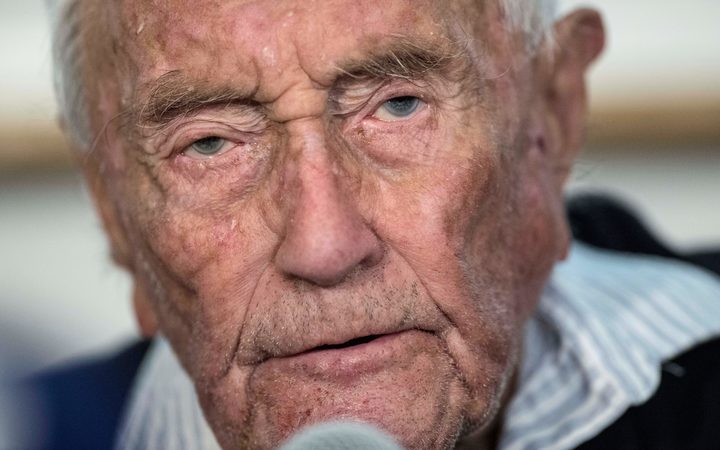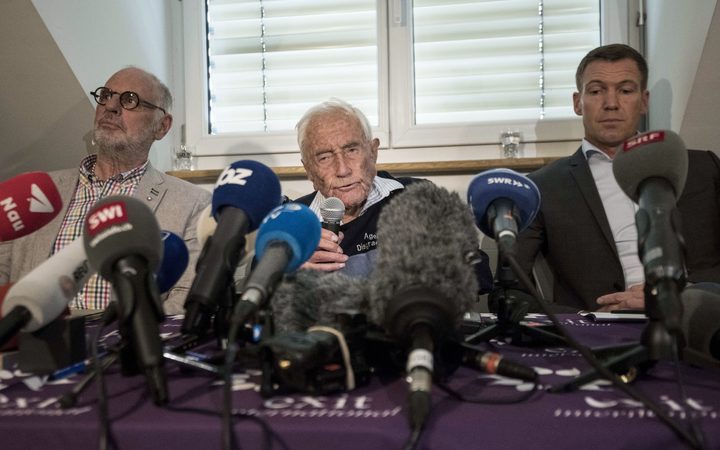Euthanasia advocate fined for importing suicide drug
A
euthanasia advocate found guilty of importing a drug which can be
used to commit suicide has been denied a discharge without
conviction.
11
May, 2018
Susan
Austen was found guilty of importing a suicide drug to New Zealand
and was denied a discharge without conviction at her sentencing on
Friday, 11 May, 2018. Photo: RNZ/Richard Tindiller
After
a trial in the High Court in
Wellington in February, Susan Dale Austen was found guilty of two
importations of pentobarbitone, but acquitted of assisting the
suicide of Annemarie Treadwell.
Earlier
this year the jury found Austen not guilty on one count of importing
the drug but guilty on two other counts of importing it, including
bringing into New Zealand the drugs Ms Treadwell used to kill
herself.
Her
lawyer Donald Stevens sought a discharge without conviction, saying
his client had displayed high ideals in her life, including support
for others, compassion, and love for humanity.
However,
Justice Thomas said Austen's crusade for a law change, as the head of
the Wellington branch of pro-euthanasia group Exit International, did
not reduce her culpability for breaking the current law.
She
entered a conviction and fined Austen a total of $7500, along with
court costs.
Euthanasia
advocates stood outside the court during the sentencing holding up
signs to support Austen's cause.
The
charges relate to the death of Ms Treadwell, 77, who was found dead
at a retirement village in Kilbirnie in Wellington in June 2016.
Ms
Treadwell's death was initially treated as not suspicious, but after
a suicide note was found the police investigated and a postmortem
revealed she had died from pentobarbitone toxicity.
Ms
Treadwell's diary revealed she was a member of a euthanasia lobby
group, which Ms Austen was also involved with.
In
the diary she referred to "suzy" helping her to obtain
drugs from overseas and also the support "suzy" was giving
her.
Excerpts
were played at previous court sessions, including part of a meeting
of a euthanasia group held at her home.
Police
were also found to have conducted a bogus drink-driving checkpoint
down the road from a Hutt Valley euthanasia meeting and had used that
pretext to collect the names and addresses of of those involved.
A
decision from the Independent Police Conduct Authority ruled
that the operation was unlawful
After
the verdict in February, Austen said she was heartened by the support
she had received.
"I
feel absolutely delighted. It's a glorious sunny day in Wellington
and I'm very lucky.
"I'm
so fortunate to have my gorgeous husband and one of my sons here and
all the supporters who have come from all around the world to be here
to support me."
David Goodall: Scientist, 104, ends his life in Switzerland
Scientist
David Goodall, 104, has died after choosing to end his life at a
clinic in Switzerland, a right-to-die organisation says.

11
May, 2018
The
lauded London-born ecologist and botanist, who was not terminally
ill, said the decision had been driven by his deteriorating quality
of life.
Mr
Goodall had flown from Australia for his assisted suicide, attracting
the attention of people around the world.
Shortly
before his death, he said he was "happy to end" his life.
"My
life has been rather poor for the past year or so and I'm very happy
to end it," he said, surrounded by several family members.
"All
the publicity that this has been receiving can only, I think, help
the cause of euthanasia for the elderly, which I want."
The
academic died "peacefully" at 10:30 GMT at the Life Cycle
clinic in Basel, from an infusion of Nembutal, a barbiturate, said
Philip Nitschke, founder of Exit International, the group which
helped him take his own life.
He
was visibly frustrated by the process of formal paperwork, and Mr
Nitschke later said: "In fact his last words were 'This is
taking an awfully long time!'"
 Australian
scientist David Goodall with Exit founder and director, Philiip
Nitschke, and Moritz Gall. Photo: AFP
Australian
scientist David Goodall with Exit founder and director, Philiip
Nitschke, and Moritz Gall. Photo: AFP
Mr
Goodall's last meal was his favourite - fish and chips and cheesecake
- and in his final minutes he was played Ode to Joy from Beethoven's
9th symphony.
Mr
Goodall had lived on his own in a small flat in Perth, Western
Australia, until only a few weeks before his trip to Switzerland.
He
stepped back from full-time employment in 1979, but remained heavily
involved in his field of work.
Among
his achievements in recent years, Mr Goodall edited a 30-volume book
series called Ecosystems of the World and was made a
Member of the Order of Australia for his scientific work.
In
2016, aged 102, he won a battle to keep working on campus at Perth's
Edith Cowan University, where he was an unpaid honorary research
associate.
Mr
Goodall said he resented having to leave Australia to end his life.
Assisted dying is legal in only one state, but eligibility requires a
person to be terminally ill.
Meanwhile,
Switzerland has allowed assisted suicide since 1942.
Mr
Goodall arrived in Basel on Monday after visiting relatives in
France, and spent his final full day exploring the Basel University
botanic gardens with three of his grandchildren.
At
a press conference on Wednesday, he said he was surprised by the
public interest in his case. He said: "I no longer want to
continue life.
"One
wants to, at my age, even rather less than my age... to be free to
choose death when the death is at an appropriate time."
He
wanted no funeral and requested that his body be donated to medicine
or his ashes sprinkled locally, Exit International said.
Assisted
suicide describes any act that intentionally helps another person
kill themselves, for example by providing them with the means to do
so, most commonly by prescribing a lethal medication.
It
differs from euthanasia, which is a third-party intervention to end a
life to relieve suffering, such as when a doctor administers the
lethal dose.



No comments:
Post a Comment
Note: only a member of this blog may post a comment.